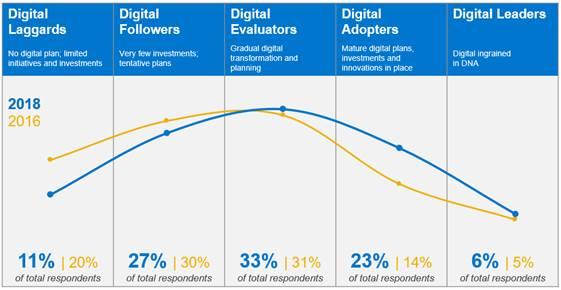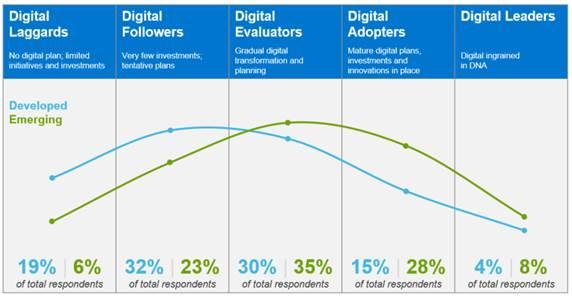Just 6% of businesses in Asia Pacific, Japan & Greater China are Digital Leaders, according to the new Dell Technologies Digital Transformation (DT) Index. Emerging markets / regions[2] are also the most digitally mature, with India and Thailand topping the regional ranking.
In collaboration with Intel and Vanson Bourne, Dell Technologies surveyed 4,600 global business leaders (director to C-suite) from mid- to large-sized companies to score their organisations’ transformation efforts. In Asia Pacific, Japan & Greater China, 1,300 business leaders across 11 countries and regions including Australia, China mainland, India, Indonesia, Japan, Malaysia, New Zealand, Singapore, South Korea, Taiwan and Thailand, were surveyed.
The DT Index II found that many businesses’ digital transformation programmes are still in their infancy. 84% of business leaders across markets in Asia Pacific, Japan & Greater China admit digital transformation should be more widespread throughout their organisation, and close to half (46%) believe they’ll struggle to meet changing customer demands within five years. More than a third (35%) still worry their organisation will be left behind in the race to become a digital entity.
Behind the curve
By comparing the results with the first DT Index, launched in 2016[3], we can see that progress has been slow and the vast majority of organisations in the region still have a long way to go to become Digital Leaders. While the percentage of Digital Evaluators and Digital Adopters has increased, there has only been a 1% increase in the percentage of Digital Leaders. Almost four in ten (38%) businesses are still spread across the two least-mature groups on the benchmark: Digital Laggards and Digital Followers.

The DT Index also uncovered that emerging markets / regions are outpacing their more developed counterparts in digital transformation. There are more Digital Leaders in emerging markets / regions in Asia Pacific, Japan & Greater China (8%) than developed markets (4%) and far fewer Laggards and Followers. Six out of the seven most digitally mature countries / regions across Asia Pacific, Japan & Greater China are emerging markets / regions – including India and Thailand.

Amit Midha, President, APJ Commercial, Dell EMC said: “In many respects, Asia Pacific, Japan & Greater China is emerging as a source of innovation: in the way it fosters new business models and embraces emerging technologies. This is a tremendous opportunity for the region – but it’s also a determined period in time. To secure their digital future and progress with innovation, businesses must accelerate their transformation – rather than slow down.”
David Webster, President, APJ Enterprise, Dell EMC, added: “Digital transformation places technology at the heart of an organisation’s products and services, to accelerate its business and help transform the customer experience. As such, it requires an equal focus on technology, people and process. Businesses are waking up to this but not in the numbers that we had hoped for by now – despite the high-stakes. Over the next decade, every organisation will need to be a digital organisation. This can be achieved, if the work starts now.”
Barriers to transformation and confidence
Linked to the meagre number of Digital Leaders, over 9 in 10 (95%) businesses are held back by persistent barriers to transformation.
The top barriers to digital transformation success in the region are data privacy and security concerns – up from fifth place in 2016. Having an ‘immature digital culture’ has risen to fourth place (from seventh place in 2016). And today, more leaders are concerned about regulation and legislative changes than they were two years ago.
The top five barriers to digital transformation success in Asia Pacific, Japan & Greater China are:
- Data privacy and security concerns (up from 5th place in 2016)
- Lack of budget and resources
- Lack of the right in-house skill-sets and expertise
- Immature digital culture (up from 7th place in 2016)
- Regulation and legislative changes (up from 10th place in 2016)
In addition to mapping businesses’ digital transformation progress, Dell Technologies asked business leaders whether they trust their organisations to govern themselves correctly, protect customer and employee data and be transparent in this rapidly changing digital world. The research reveals that four in ten (41%) believe their organisation will struggle to prove it is trustworthy within the next five years. One-third do not trust their organisation to look after employee data (33%) or customer data (35%) and almost three in ten (29%) of Asia Pacific, Japan & Greater China leaders don’t trust their own organisations to comply with regulations (such as GDPR). The findings suggest that business leaders lack faith in their organisation’s ability to be transparent and compliant.
Plans to realise their digital future
On the plus side, leaders have reported common priorities and investments to aid future transformation, including an increased focus on their workforce, security and IT. However, many of these measures still aren’t ubiquitous. More than half of those in the region (51%) are developing in-house digital skills and talent, for instance by teaching all employees how to code (up from 23% in 2016). While there has been movement, in this digital era, the percentage of companies investing in their digital skills could be higher.
The top planned technology investments for the next one to three years, as identified by the research, are as follows:
- Cybersecurity: 61%
- Internet of Things tech: 53%
- Artificial Intelligence: 50%
- Multi-cloud environment: 47%
- Compute-centric approach: 38%
Research methodology
During the summer of 2018, independent research company Vanson Bourne surveyed 4,600 business leaders from mid- to large-size companies across 42 countries / sub-regions to gauge their organisations’ place on the Dell Technologies Digital Transformation Index. Vanson Bourne classified businesses’ digital business efforts by examining their IT strategy, workforce transformation initiatives and perceived performance against a core set of digital business attributes.
In Asia Pacific, Japan & Greater China, 1,300 business leaders across 11 countries and regions, including Australia, China mainland, India, Indonesia, Japan, Malaysia, New Zealand, Singapore, South Korea, Taiwan and Thailand, were surveyed.
Additional resources
- Dell Technologies Digital Transformation Index II local results and additional information on the 2016 Dell Technologies Digital Transformation Index
- Additional information on Dell Technologies’ Realizing 2030 program
- Follow the latest news on Twitter from @DellTech, @Dell and @DellEMC
About Dell Technologies
Dell Technologies is a unique family of businesses that provides the essential infrastructure for organisations to build their digital future transform IT and protect their most important asset, information. The company services customers of all sizes across 180 countries – ranging from 99 percent of the Fortune 500 to individual consumers – with the industry’s most comprehensive and innovative portfolio from the edge to the core to the cloud.
About Vanson Bourne
Vanson Bourne is an independent specialist in market research for the technology sector. Its reputation for robust and credible research-based analysis is founded upon rigorous research principles and an ability to seek the opinions of senior decision makers across technical and business functions, in all business sectors and all major markets. For more information, visit www.vansonbourne.com.
[1] Status for developed and emerging markets/ regions were defined using the FTSE classifications
[2] Status for developed and emerging markets/ regions were defined using the FTSE classifications
[3] In 2016, DT Index surveyed 4,000 global business leaders across 16 countries/ regions. In 2018, DT Index surveyed 4,600 global business leaders across 42 countries/ regions.
